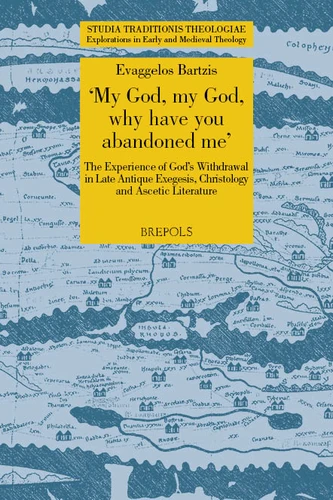'My God, my God, why have you abandoned me'. The Experience of God’s Withdrawal in Late Antique Exegesis, Christology and Ascetic Literature
Par :Formats :
- Paiement en ligne :
- Livraison à domicile ou en point Mondial Relay indisponible
- Retrait Click and Collect en magasin gratuit
- Réservation en ligne avec paiement en magasin :
- Indisponible pour réserver et payer en magasin
- Nombre de pages217
- PrésentationBroché
- Poids0.39 kg
- Dimensions15,6 cm × 23,4 cm × 0,0 cm
- ISBN978-2-503-59360-9
- EAN9782503593609
- Date de parution29/07/2021
- CollectionStudia Traditionis Theologiae
- ÉditeurBrepols
Résumé
The motif of Gods turning away his face still matters in theology as a direct aftermath of the horrors that the world experienced during WWII and also in the wake of the promotion of an excessive reading of theology, called kenotic. It even appears in unexpected places with no discernible association to the historical development of the Christian doctrine (Caputo, Žižek and C.S.Lewis). This book provides a historical supplement to current approaches and explores the way that late antique theology laid out the theoretical substratum on which modern approaches could anchor themselves.
It presents the nuanced ways in which the motif of divine abandonment developed in late antiquity, displays the various threads of thought that theology pursued in different contexts (exegesis, Christology and ascetic desert literature), and raises three points : - the extent to which parallel lines were drawn in late antique theology between the experiences of the bride in the Song of Songs, Jesus on the cross and the early ascetics ; - the normativeness of divine abandonment in early Christian thought and its association to sinfulness ; - the possibility that late antique theology had introduced a Jesus-like ‘kind' of abandonment.
It presents the nuanced ways in which the motif of divine abandonment developed in late antiquity, displays the various threads of thought that theology pursued in different contexts (exegesis, Christology and ascetic desert literature), and raises three points : - the extent to which parallel lines were drawn in late antique theology between the experiences of the bride in the Song of Songs, Jesus on the cross and the early ascetics ; - the normativeness of divine abandonment in early Christian thought and its association to sinfulness ; - the possibility that late antique theology had introduced a Jesus-like ‘kind' of abandonment.
The motif of Gods turning away his face still matters in theology as a direct aftermath of the horrors that the world experienced during WWII and also in the wake of the promotion of an excessive reading of theology, called kenotic. It even appears in unexpected places with no discernible association to the historical development of the Christian doctrine (Caputo, Žižek and C.S.Lewis). This book provides a historical supplement to current approaches and explores the way that late antique theology laid out the theoretical substratum on which modern approaches could anchor themselves.
It presents the nuanced ways in which the motif of divine abandonment developed in late antiquity, displays the various threads of thought that theology pursued in different contexts (exegesis, Christology and ascetic desert literature), and raises three points : - the extent to which parallel lines were drawn in late antique theology between the experiences of the bride in the Song of Songs, Jesus on the cross and the early ascetics ; - the normativeness of divine abandonment in early Christian thought and its association to sinfulness ; - the possibility that late antique theology had introduced a Jesus-like ‘kind' of abandonment.
It presents the nuanced ways in which the motif of divine abandonment developed in late antiquity, displays the various threads of thought that theology pursued in different contexts (exegesis, Christology and ascetic desert literature), and raises three points : - the extent to which parallel lines were drawn in late antique theology between the experiences of the bride in the Song of Songs, Jesus on the cross and the early ascetics ; - the normativeness of divine abandonment in early Christian thought and its association to sinfulness ; - the possibility that late antique theology had introduced a Jesus-like ‘kind' of abandonment.

